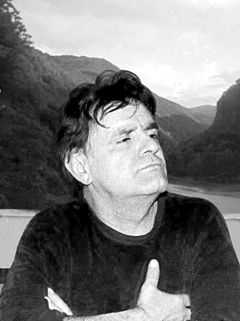Fazil Iskander
| Fazil Iskander | |
|---|---|
 Photograph by Remziy Agrba | |
| Born |
March 6, 1929 Sukhumi, USSR |
| Genres | Fiction |
| Notable work(s) | Sandro of Chegem |

Fazil Abdulovich Iskander (Russian: Фази́ль Абду́лович Исканде́р; Abkhaz: Фазиль Абдул-иҧа Искандер; born 6 March 1929, Sukhumi, USSR) is an Abkhaz writer, known in the former Soviet Union for his descriptions of Caucasian life, mostly written in Russian. He has written various stories, most famously "Zashita Chika", which star a crafty and likable young boy named "Chik".
Biography
The most famous intellectual of Abkhazia, he first became well known in the mid-1960s along with other representatives of the "young prose" movement like Yury Kazakov and Vasily Aksyonov, especially for what is perhaps his best story,[1] Sozvezdie kozlotura (1966), variously translated as "The Goatibex Constellation," "The Constellation of the Goat-Buffalo," and "Constellation of Capritaurus." It is written from the point of view of a young newspaperman who returns to his native Abkhazia, joins the staff of a local newspaper, and is caught up in the publicity campaign for a newly produced farm animal, a cross between a goat and a West Caucasian tur (Capra caucasica); a "remarkable satire of Lysenko's genetics and Khrushchev's agricultural campaigns, it was harshly criticized for showing the Soviet Union in a bad light."[2]
He is probably best known in the English speaking world for Sandro of Chegem, a picaresque novel that recounts life in a fictional Abkhaz village from the early years of the 20th century until the 1970s, which evoked praise for the author as "an Abkhazian Mark Twain."[3] Mr. Iskander's humor, like Mark Twain's, has a tendency to sneak up on you instead of hitting you over the head.[3] This rambling, amusing and ironic work has been considered as an example of magic realism, although Iskander himself said he "did not care for Latin American magic realism in general".[4] Five films were made based upon parts of the novel.
Iskander distanced himself from the Abkhaz secessionist strivings in the late 1980s and criticised both Georgian and Abkhaz communities of Abkhazia for their ethnic prejudices. [citation needed] He warned that Abkhazia could become a new Nagorno-Karabakh. [citation needed] He currently resides in Moscow and is a writer for the newspaper Kultura.
On 3 September 2011, a statue of Iskander's literary character Chik was unveiled on Sukhumi's Muhajir Quay. [5]
List of awards and prizes

- USSR State Prize (1989) - for his novel "Sandro of Chegem"[6][7]
- Alfred Toepfer foundation's Pushkin Prize (1992)[8]
- State Prize of the Russian Federation in Literature and Arts (1993)[9]
- Triumph Prize (1999).[10]
- Order of Honour and Glory, 1st class (Abkhazia, 18 June 2002) [11]
- Order of Merit for the Fatherland;
- 2nd class (29 September 2004)
- 3rd class (3 March 1999)
- 4th class (13 March 2009, presented on February 17, 2010.[12])
- Honorary Member of Russian Academy of Arts
In 2009, Bank of Abkhazia issued a commemorative silver coin from the series "Outstanding Personalities of Abkhazia", dedicated to Fazil Iskander denomination of 10 apsaras.
Notes
Works in English translation
- Forbidden Fruit and Other Stories, Central Books LTD, 1972.
- The Goatibex Constellation, Ardis, 1975.
- Sandro of Chegem, Vintage Books, 1983.
- The Gospel According to Chegem, Vintage Books, 1984.
- Chik and His Friends, Ardis 1985.
- Rabbits and Boa Constrictors, Ardis, 1989.
- The Old House Under the Cypress Tree, Faber and Faber, 1996.
- The Thirteenth Labour of Hercules, Raduga, 1997.
Online
References
- ↑ Edward J. Brown, Russian Literature Since the Revolution (Harvard University Press, 1982: ISBN 0-674-78204-6), p. 331.
- ↑ Karen L. Ryan-Hayes, Contemporary Russian Satire: A Genre Study (Cambridge University Press, 2006: ISBN 0-521-02626-1), p. 15.
- ↑ 3.0 3.1 Jacoby, Susan. "An Abkhazian Mark Twain". The New York Times. 15 May 1983. Retrieved 24 June 2009.
- ↑ Haber, Erika (2003). The Myth of the Non-Russian. Lexington Books. ISBN 0-7391-0531-0.
- ↑ "В Абхазии появился первый памятник литературному герою". Regnum. 4 September 2011. Retrieved 23 September 2011.
- ↑ The Myth of the Non-Russian: Iskander and Aitmatov's Magical Universe, Erika Haber, Lexington Books, UK, 2003. (Page 65: "Iskander was awarded the USSR State Prize in November 1989")
- ↑ Remaking Russia: Voices from Within, Edited by Heyward Isham, Intro by Richard Pipes, M.E. Sharp 1995. (Intro, page xviii, "USSR State Prize 1989")
- ↑ "Puschkin-Preis 2005 für Boris Paramonow" (in German). Alfred Toepfer Stiftung F.V.S. 2005-05-26. Retrieved 2009-10-03.
- ↑ Yeltsin, Boris (2003-12-07). "Указ Президента РФ от 7.12.1993 № 2120" (in Russian). Moscow: Официальный сайт Президента Российской Федерации. Retrieved 2009-10-03.
- ↑ Abkhaz.org
- ↑ "Фазиль Искандер награжден высшим орденом Абхазии" (in Russian). Kafkas Vakfi. 2002-06-20. Retrieved 2009-10-03.
- ↑ http://news.kremlin.ru/news/6895
|